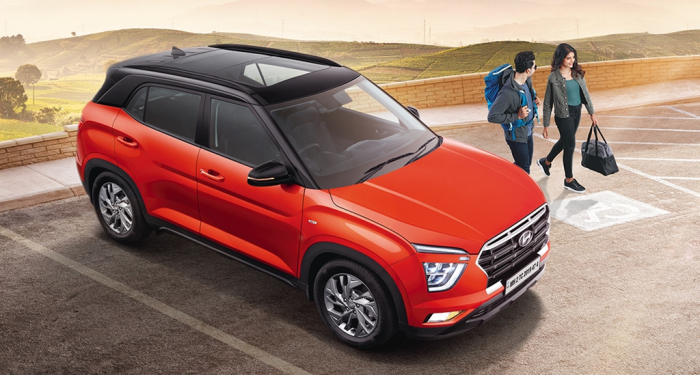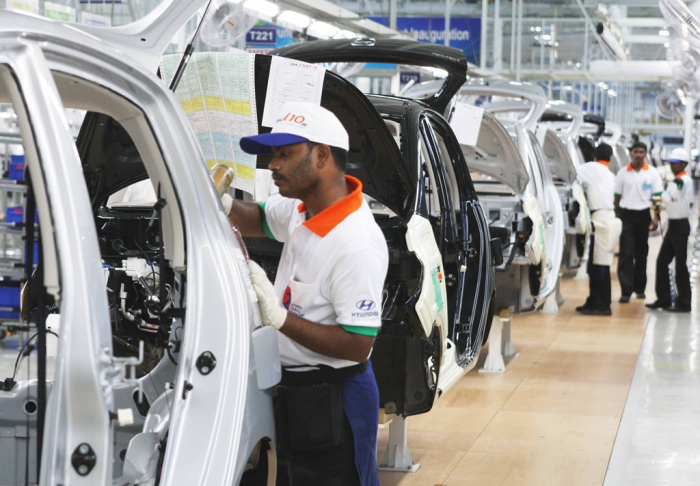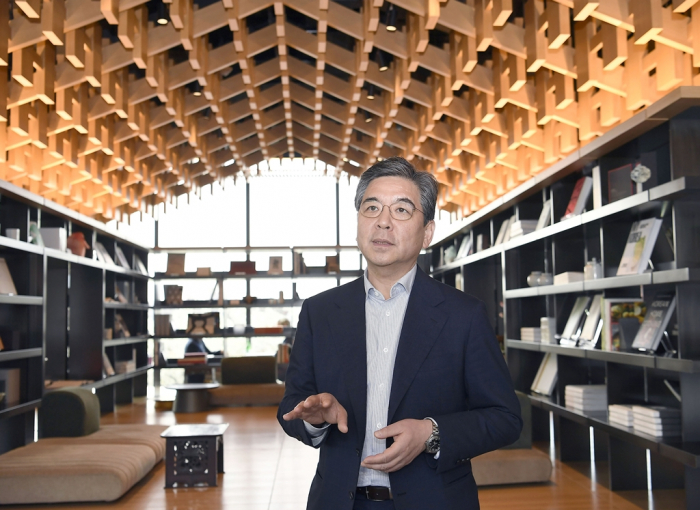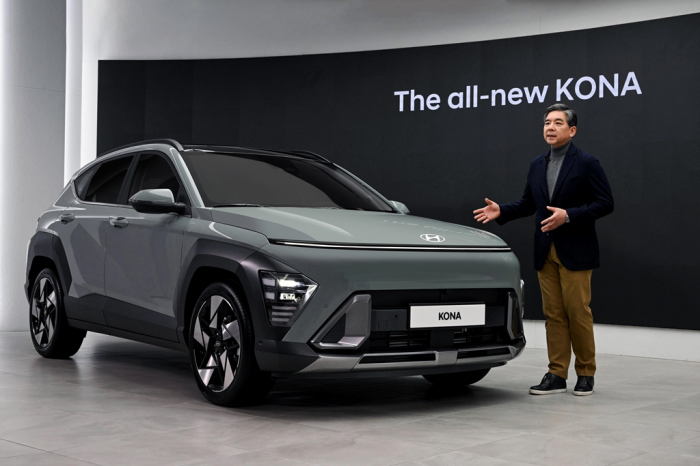Electric vehicles
Hyundai to invest $2.45 bn in India, eyes spot in global EV top 3
Hyundai, the second-largest carmaker in India, also plans to build a battery pack assembly line in Chennai
By May 12, 2023 (Gmt+09:00)
3
Min read
Most Read
LG Chem to sell water filter business to Glenwood PE for $692 million


Kyobo Life poised to buy Japan’s SBI Group-owned savings bank


KT&G eyes overseas M&A after rejecting activist fund's offer


StockX in merger talks with Naver’s online reseller Kream


Mirae Asset to be named Korea Post’s core real estate fund operator



South Korea’s top automaker Hyundai Motor Co. will invest 200 billion rupees ($2.45 billion) in the Indian state of Tamil Nadu over the next decade to strengthen its presence in the world’s third-largest car market.
Through its Indian subsidiary, Hyundai Motor India Ltd., the Korean carmaker will also set up a battery pack assembly plant in Chennai, dubbed the Detroit of Asia, and install 100 electric vehicle charging stations across the southern state over the next five years.
“The long-term investment will help enhance our manufacturing capacity, enabling us to make the best EVs and internal combustion engine vehicles in Tamil Nadu for the rest of the world,” Kim Un-soo, chief of Hyundai Motor India, said on Thursday.
With about 4.73 million car sales in the domestic market last year, India is the world’s third-largest auto market after China and the US and among the fastest-growing EV markets in Asia. India is also the world’s second most populous country after China.

HUGE GROWTH POTENTIAL
With only a handful of companies offering electric cars, India’s EVs accounted for a mere 1% of its total four-wheeler sales in 2022. The Indian government is pushing to expand EV adoption by incentivizing carmakers and subsidizing consumers to raise the share of EVs to 30% of its total cars by 2030.
Hyundai is India’s second-largest carmaker, controlling 15% of the market, only behind top carmaker Maruti Suzuki India, the local unit of Japan’s Suzuki Motor.
Hyundai Motor India said it aims to increase the production volume at its two factories in Chennai to 850,000 units from the current 775,000 cars. It didn’t provide the timeframe.
The company said in March that it signed a term sheet with General Motors to acquire the US carmaker’s Talegaon Plant in Maharashtra.
The Talegaon Plant owned by GM, which withdrew from India in 2017 due to sluggish sales, had an annual capacity of 130,000 cars.

THE WORLD’S TOP 3 EV PLAYERS BY 2030
Meanwhile, Hyundai Motor Chief Executive Chang Jae-hoon said the Korean carmaker aims to join the ranks of the world’s top three EV makers by 2030 by selling at least 2 million cars annually by then.
“We are now developing two more platforms and that will enable us to have 18 models by 2030. And we are [aiming] to achieve 2 million [annual] EV sales around 2030,” he said in a recent interview with CNBC.
Hyundai Motor Group, which includes Hyundai, Kia Corp. and premium brand Genesis, ranked sixth in global EV sales last year, according to market tracker SNE Research.
It delivered 510,000 electric cars in 2022, up 40.9% from the year prior.

The automotive group is investing heavily in research and development, building new plants and platforms as well as expanding EV lines and production capacity.
Its EVs, including the INOIQ 5 crossover and IONIQ 6 sedan, are currently developed on an advanced bespoke EV platform, the Hyundai Electric Global Modular Platform (E-GMP).
Hyundai plans to introduce vehicles in 2025 based on its two new EV platforms, eM and eS, which are expected to lead to more efficient vehicle development and greater cost reductions.
“During the last three years, our EBIT growth is 50% every year. This is mainly driven by our products, especially the IONIQ 5 and IONIQ 6, which are well-perceived by the customers,” Chang told CNBC.
“We can continue the momentum. We have another EV, the IONIQ 7, the three-row largest SUV, in our pipeline for next year.”
Overall, Hyundai and Kia sold a combined 6.85 million vehicles globally last year, ranking third after Japan’s Toyota Motor and Germany’s Volkswagen.
Write to Sungsu Bae at baebae@hankyung.com
In-Soo Nam edited this article.
More to Read
-
 Korean stock marketMoney moves from US, China to India for higher returns
Korean stock marketMoney moves from US, China to India for higher returnsMay 09, 2023 (Gmt+09:00)
2 Min read -
 AutomobilesHyundai to boost India presence via takeover of GM plant
AutomobilesHyundai to boost India presence via takeover of GM plantMar 13, 2023 (Gmt+09:00)
1 Min read -
 AutomobilesBangladesh: Hyundai’s next target for partially assembled Tucson SUV
AutomobilesBangladesh: Hyundai’s next target for partially assembled Tucson SUVFeb 27, 2023 (Gmt+09:00)
3 Min read -
 AutomobilesHyundai, Kia post record sales in India; to build IONIQ 5 locally
AutomobilesHyundai, Kia post record sales in India; to build IONIQ 5 locallyJan 10, 2023 (Gmt+09:00)
4 Min read -
 Electric vehiclesHyundai faces growing rivalry with China’s BYD in Southeast Asia
Electric vehiclesHyundai faces growing rivalry with China’s BYD in Southeast AsiaSep 14, 2022 (Gmt+09:00)
2 Min read
Comment 0
LOG IN


